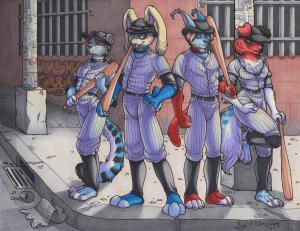
Apparently, someone else had thought of “The Baseball Furries” first
My bar trivia team changes its name with each new tournament. Every few months, this becomes a ritual where I pitch a series of disgusting and/or esoteric names like Bridget Jones’s Diarrhea or Rod Torfulson’s Armada Featuring Herman Menderchuk and the group rolls their eyes as they reject my ideas. In the last go-around, I became insistent that we name ourselves after one of the gangs from the 1979 cult film The Warriors. For no particular reason, I especially wanted to be called The Baseball Furies. In a flash of brilliance and to my surprise, a teammate suggested that we be called The Baseball Furries – combining the fictional gang with the name for people whose sexual fetish is to dress up like a Care Bear.1
This was a good name for a trivia team, but considering their usual aversion to jokes that might offend, I was surprised that the team was amenable to this name. It was difficult for me to imagine naming our team after any minority group – sexual or otherwise. I had to conclude that everyone pretty much assumed there to be no furries in the bar, nor would there be any in our social groups that could possibly take offense.

Drew Carey dabbles.
Furries might exist somewhere, but nowhere, we assume, near us. It makes them a convenient reference for a laugh about other people’s perversion. And yet, our assumption that it is a minority group so small as to be nonexistent belies our and everyone else’s assumed familiarity with the practice. For a group that barely exists, there sure are a lot of people talking about furries. This is why the group is “fictional” – the amount of discourse that surrounds furry-ism immeasurably outweighs the reality of its practice. That it is other people’s perversion is key. Furry fetishism is so far off the radar of seemingly possible sexuality that it has come to stand in as a marker for sexual deviance in comedy. It is a common target for television comedies like The Drew Carey Show, Entourage, and Check It Out with Dr. Steve Brule. And in a comic twist on “rule 34,” furry culture is the topic of a lot of internet mockery.2
In an episode of 30 Rock, unlucky-in-love Liz Lemon finds a seemingly great guy who is single. Too good to be true? Yes – he’s a furry. This is reminiscent of the “all the good men are gay” sitcom trope where a woman falls for a gay man. One variation of this trope, which became the basis for Will and Grace, has a female character only realize at a humiliatingly late moment that her crush is gay. The key difference between Grace and Liz, however, is that while Will’s sexuality allowed the pair to easily reformulate their relationship as friends, Liz was so horrified at the prospect of furry-ism that it was borderline unimaginable for her to spend any more time with this man. And as the primary surrogate for the audience, it was implied that the we too should be comically horrified by the prospect of explorations in furry sexuality. That kind of experimentation was Jenna’s domain.
It is difficult to imagine, in the current media environment, having a character like Liz Lemon be horrified by a homosexual. Homer Simpson could get away with homophobia in 1997, as long as he learned tolerance by the end of the program. Although homophobia still exists in American comedy, the kind that would blatantly encourage a kind of abject dread is not terribly common in contemporary mass media. This is due to a host of factors, notably general changing social mores as well as more pointed calls for responsible representation by gay rights groups. Jokes constantly change their particulars while maintaining a common structure. That some gay jokes have shifted their target to furries is thus less notable than the fact that jokes have shifted from an identifiable group to a practically unidentifiable one.
And this is neither only nor simply an issue of redirected homophobia. Jeffrey Sconce provocatively suggests that “the unconscious is slowly dying out” in part because of, “the Internet’s ability to actualize any and all erotic scenarios in seconds.” From a Freudian standpoint, the lack of an unconscious would obviate the need for humor or sexual shame, so why do we seem stubbornly stuck with jokes at the expense of furries? Furry jokes demonstrate at least some aspect of the unconscious is alive and that it is desperately trying to Other furries in an attempt to normalize the things of which we are all silently ashamed. We need furries because they make your internet browser history seem less embarrassing. But beware. Once that stuff becomes normalized, there will be few places left to go for the thrill of perversion. Someday, we will all become furries.
1I am aware that sex is supposedly only a part of this subculture, but let’s be honest – that’s how everyone thinks about this group. Read on in any case, because this relates to my point.
2Rule 34 states that on the internet, if it exists, there is porn of it.

posted on 19 January at 08:51
I'm a wolf and no I'm not a full furry just a neko (tails and ears only) and I find the care bear comment offensive but I like your name :3